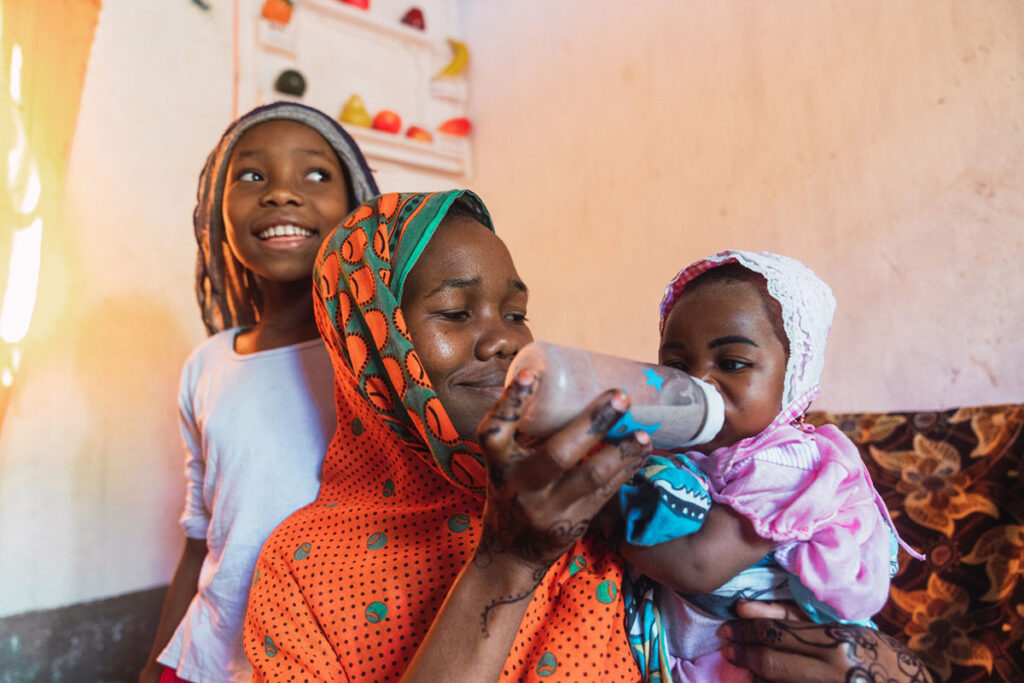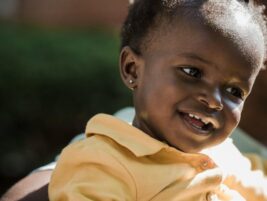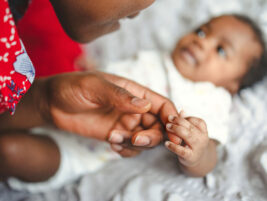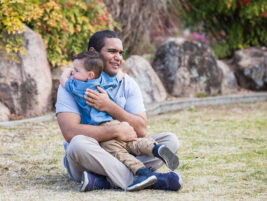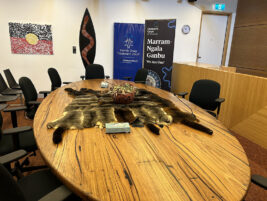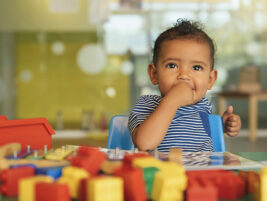Since 2016, the Danish NGO Fairstart Foundation [FS] has developed a comprehensive approach to addressing significant global stressors that affect parents and caregivers of infants, particularly in the context of non-parental care. FS´s mission is to transform recommendations for childcare from international research into education, tailored to the various needs of partner organizations worldwide. This approach focuses on educating staff in partner NGO´s and government agencies as trainers of local caregiver groups. By developing digital education and culturally tailored group training programs, Fairstart has created an efficient and scalable method for training caregivers of infants and children. Results indicate lowered caregiver stress and improvements in child development (Fairstart 2019). The following text highlights the key points from this approach, with a focus on stressors for parents and infants, online education of local partner staff as instructors, and instruments for measuring outcomes from attachment-based training programs. Lessons learned are summarized to inspire future digital designs.
Stressors for Parents and Infants
Across cultures, many families are experiencing unprecedented stress as they adapt to urban life, which often disrupts traditional caregiving structures. Projections indicate that 80 % of the world population will live in major cities by 2050 (World Bank Urban Development 2023). One primary stressor is the breakdown of extended family and community networks, which previously provided a natural support system for child-rearing. In urban environments, parents often face economic hardship, housing instability, and limited access to social services, all of which contribute to parental stress and ultimately affect the quality-of-care infants receive. Additionally, caregivers in alternative care systems (e.g., orphanages or foster care) often lack adequate training (a global need of 1,2 million mental health workers in low-income countries further exacerbates the problem) (Endale et al. 2020). These stressors necessitate interventions that can provide both parents and caregivers with the tools to deliver high-quality, attachment-based care.
Online Classrooms to Educate Fairstart Partner Instructors
Based on recommendations of care from an international network of researchers, FS developed an online classroom model on the edX virtual platform from Harvard and MIT, designed to educate partner staff as trainers (instructors) across diverse cultural settings. After a local three-day start-up seminar with FS staff, students follow eight 4-hour modules, delivered over a six-month period. Modules cover topics such as attachment theory, caregiver group development, and learning theory. Each module includes instructional videos, research summaries, and practical exercises that caregivers can implement in their daily care routines.
Attachment-Based Online Group Training Programs for Caregivers
Each module prepares a student to conduct a group training session with a local group of caregivers or parents, who then design individualized care plans for children in their care. After local research and interviews, FS group training sessions are designed and adapted to local cultural strengths, challenges and language. When meeting at the eight three-hour group sessions, caregivers form strong groups for mutual support, and learn and apply new care practices with continuous support from their instructors and Fairstart.
The program includes FS´s simple pre- and post-training questionnaires (Scorecards), designed for illiterate caregivers, to measure caregiver stress and well-being as well as caregiver assessments of child development. An external study found Scorecard reliability and validity for children ages 0-12 to be comparable with other instruments (Hecker et al. 2022). The training programs are not only designed for caregivers of infants but also cover the needs of older children and adolescents (such as sessions on how secure caregiver behavior can enhance brain development). This holistic approach ensures that caregivers are supported through all stages of child development, as illustrated in a feedback interview with three African foster mothers (Fairstart 2021).
Outcomes
The results of Fairstart’s training programs have been significant. Over 800 instructors have been trained in 36 countries in close cooperation with partners, ranging from SOS Children´s Village staff in 13 African countries, to educating municipality staff for Greenland Government. Students have trained caregivers responsible for more than 70,000 children. Caregivers reported greater confidence in managing challenging behaviors caused by separation trauma, and children showed improvements in emotional regulation and social skills (SOS Evaluation Report 2019). In addition to individual-level outcomes, the program has contributed to local systemic changes in the way care is provided. In some partner countries, elements of FS have been included in national parenting programs. Besides, all training sessions are open source online in many language versions, visited by many interested professionals (Fairstart 2024).
Lessons learned: The Power of Intercultural Partnerships and Online Educations
The combination of intercultural partnerships and online education has proven to be a powerful tool for reaching large populations at a relatively low cost. Equipped with a universal serial bus (USB) containing the 21 group sessions, FS graduates now train caregivers in remote and underserved areas, ensuring that even the most vulnerable children receive the care they need. The flexibility of the online model allows for continuous adaptation to local cultural contexts, making the training more effective and sustainable over time. The FS project has spurred much interest from researchers – papers on various aspects of the project have been downloaded more than 5000 times (ResearchGate.net 2024). To further inspire intervention designs, Rygaard and co-editors invited researchers worldwide to describe risk for children in their countries, and their intervention programs (Rygaard et al. 2024)
The emergence of Artificial Intelligence (AI, Chat GPT programs, etc.) may allow for further upscaling and adaptation to local cultures. However, lessons learned show that the success of online-based interventions for infant care only emerge in long-term cooperation and dialogues with partners, and the formation of strong intercultural networks on equal terms. Partners must be involved in program design from the very start, and cultural care traditions and strengths must be merged with the general recommendations from care research. Another valuable lesson is that trainings of caregivers per se will only have limited effects, unless combined with the strengthening the professional competences of local mental health workers and their organizations. The FS pre-and-post tools for outcome measurement of attachment-based interventions in low-income countries are one attempt to retrieve reliable data, and will hopefully inspire further methodological research.
About this paper
A full version of this paper can be found in Osofsky, J. D., Fitzgerald, H. E., Keren, M., & Puura, K. (2024). Chapter 9: Parenting and Infant Mental Health in Global Perspective: Exploring Standards for Virtual Intervention Designs by Rygaard, N.P WAIMH Handbook of Infant and Early Childhood Mental Health (Vol 2): Cultural Context, Prevention, Intervention, and Treatment. Cham, Switzerland; Springer Nature Switzerland AG.
References
Endale, T., Qureshi, O., Ryan, G.K. et al. (2020). Barriers and drivers to capacity-building in global mental health projects. Int J Ment Health Syst 14, 89. https://doi.org/10.1186/s13033-020-00420-4
Fairstart. (2019). https://usercontent.one/wp/fairstartfoundation.com/wp-content/uploads/2018/02/Fairstart_Learning_Theory_Final.pdf?media=1715070267
Fairstart. (2021). Feedback interview with three African foster mothers after training. https://www.youtube.com/watch?v=-0MM4Y53VZs
Fairstart. (2024). Free group training sessions in several languages. Click for example the AfE flag. Move cursor over “Foster Care” in the menu line. From the list that opens, click any session to study. https://fairstartfoundation.com/programme-overview/
Hecker, T., Mkinga, G., Hach, K., Ssentuuwa, R., Machumu, M., Rygaard, N. P., … Scharpf, F. (2022). Testing the psychometric quality of screening tools for the well-being of children and caregivers in alternative care-settings: a multi-informant study with families in Tanzania. Vulnerable Children and Youth Studies, 18(4), 672–685. https://doi.org/10.1080/17450128.2022.2075068
Researchgate.Net. (2024). https://www.researchgate.net/profile/Niels-Rygaard/research
Rygaard, N.P., Congress, E., Gielen, U., Larock, J. (Eds.) (2024). Children Around the World – the Future of Our Earth. IAP Publishers. https://www.infoagepub.com/products/Children-Around-the-World
SOS Evaluation Report. (2019). Retreived from: https://fairstartfoundation.com/wp-content/uploads/2018/10/SOS_Evaluationreport_Final.pdf
World Bank Urban Development. (2023). Retrieved from: https://www.worldbank.org/en/topic/urbandevelopment/overview
Authors
Rygaard, Niels Peter (Denmark)


